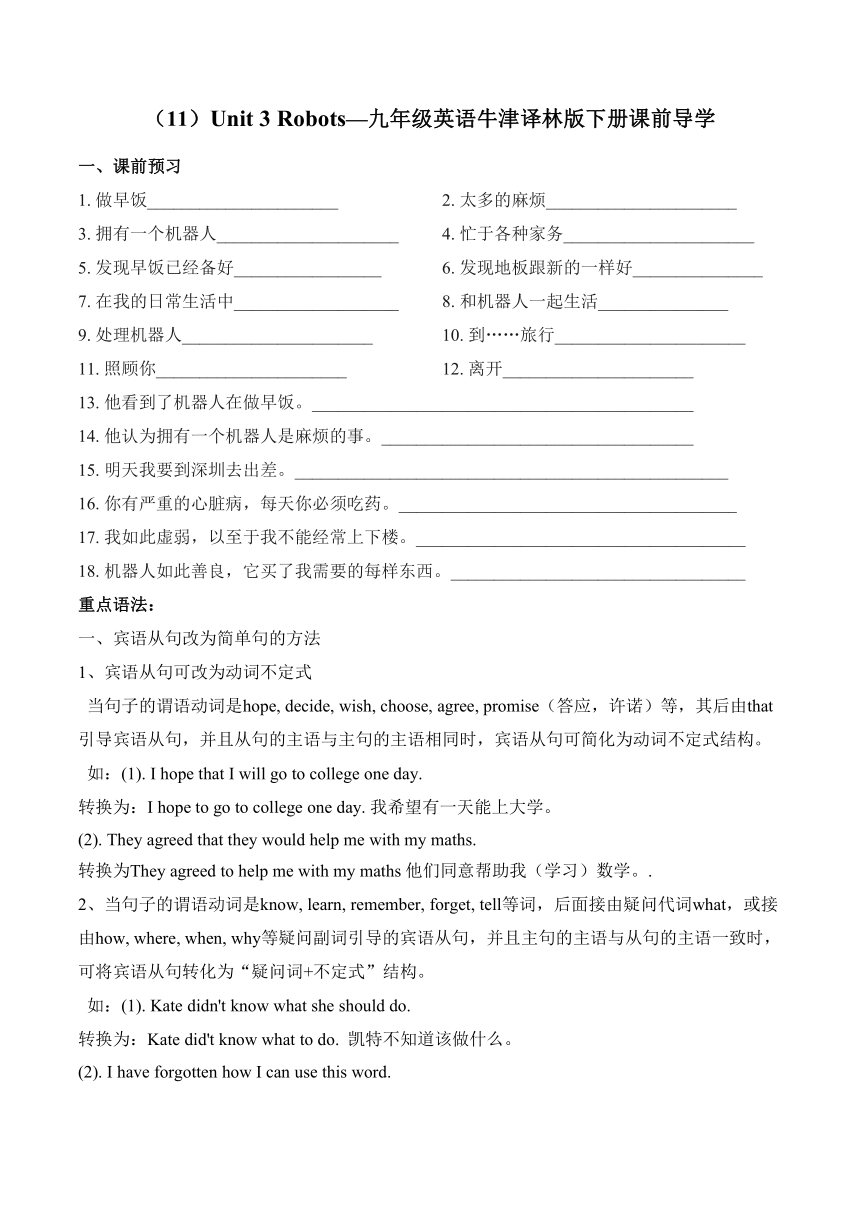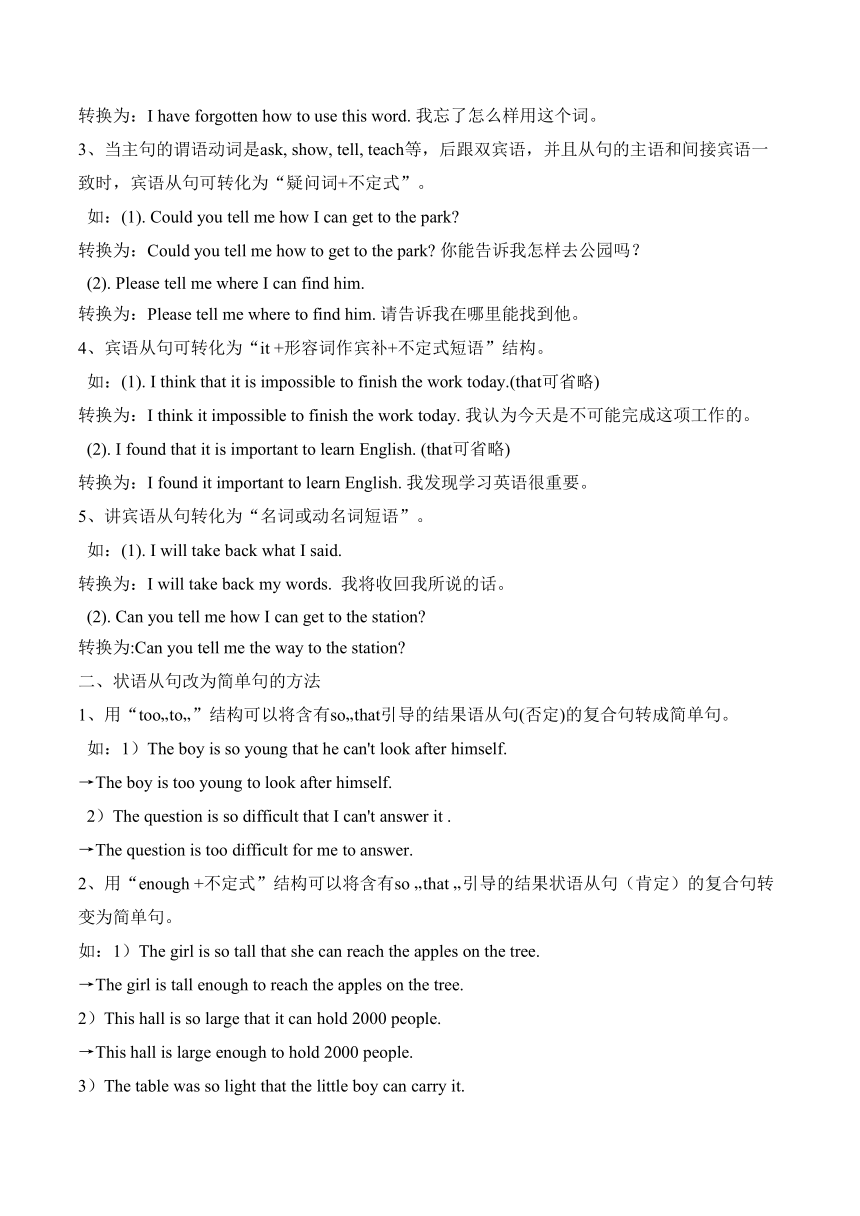Unit 3 Robots(含解析)—九年级英语牛津译林版下册课前导学
文档属性
| 名称 | Unit 3 Robots(含解析)—九年级英语牛津译林版下册课前导学 |

|
|
| 格式 | docx | ||
| 文件大小 | 24.5KB | ||
| 资源类型 | 教案 | ||
| 版本资源 | 牛津译林版 | ||
| 科目 | 英语 | ||
| 更新时间 | 2024-08-17 10:31:07 | ||
图片预览


文档简介
(11)Unit 3 Robots—九年级英语牛津译林版下册课前导学
课前预习
1. 做早饭______________________ 2. 太多的麻烦______________________
3. 拥有一个机器人_____________________ 4. 忙于各种家务______________________
5. 发现早饭已经备好_________________ 6. 发现地板跟新的一样好_______________
7. 在我的日常生活中___________________ 8. 和机器人一起生活_______________
9. 处理机器人______________________ 10. 到……旅行______________________
11. 照顾你______________________ 12. 离开______________________
13. 他看到了机器人在做早饭。____________________________________________
14. 他认为拥有一个机器人是麻烦的事。____________________________________
15. 明天我要到深圳去出差。__________________________________________________
16. 你有严重的心脏病,每天你必须吃药。_______________________________________
17. 我如此虚弱,以至于我不能经常上下楼。______________________________________
18. 机器人如此善良,它买了我需要的每样东西。__________________________________
重点语法:
一、宾语从句改为简单句的方法
1、宾语从句可改为动词不定式
当句子的谓语动词是hope, decide, wish, choose, agree, promise(答应,许诺)等,其后由that引导宾语从句,并且从句的主语与主句的主语相同时,宾语从句可简化为动词不定式结构。
如:(1). I hope that I will go to college one day.
转换为:I hope to go to college one day. 我希望有一天能上大学。
(2). They agreed that they would help me with my maths.
转换为They agreed to help me with my maths 他们同意帮助我(学习)数学。.
2、当句子的谓语动词是know, learn, remember, forget, tell等词,后面接由疑问代词what,或接由how, where, when, why等疑问副词引导的宾语从句,并且主句的主语与从句的主语一致时,可将宾语从句转化为“疑问词+不定式”结构。
如:(1). Kate didn't know what she should do.
转换为:Kate did't know what to do. 凯特不知道该做什么。
(2). I have forgotten how I can use this word.
转换为:I have forgotten how to use this word. 我忘了怎么样用这个词。
3、当主句的谓语动词是ask, show, tell, teach等,后跟双宾语,并且从句的主语和间接宾语一致时,宾语从句可转化为“疑问词+不定式”。
如:(1). Could you tell me how I can get to the park
转换为:Could you tell me how to get to the park 你能告诉我怎样去公园吗?
(2). Please tell me where I can find him.
转换为:Please tell me where to find him. 请告诉我在哪里能找到他。
4、宾语从句可转化为“it +形容词作宾补+不定式短语”结构。
如:(1). I think that it is impossible to finish the work today.(that可省略)
转换为:I think it impossible to finish the work today. 我认为今天是不可能完成这项工作的。
(2). I found that it is important to learn English. (that可省略)
转换为:I found it important to learn English. 我发现学习英语很重要。
5、讲宾语从句转化为“名词或动名词短语”。
如:(1). I will take back what I said.
转换为:I will take back my words. 我将收回我所说的话。
(2). Can you tell me how I can get to the station
转换为:Can you tell me the way to the station
二、状语从句改为简单句的方法
1、用“too to ”结构可以将含有so that引导的结果语从句(否定)的复合句转成简单句。
如:1)The boy is so young that he can't look after himself.
→The boy is too young to look after himself.
2)The question is so difficult that I can't answer it .
→The question is too difficult for me to answer.
2、用“enough +不定式”结构可以将含有so that 引导的结果状语从句(肯定)的复合句转变为简单句。
如:1)The girl is so tall that she can reach the apples on the tree.
→The girl is tall enough to reach the apples on the tree.
2)This hall is so large that it can hold 2000 people.
→This hall is large enough to hold 2000 people.
3)The table was so light that the little boy can carry it.
→The table was light enough for the little boy to carry.
3、用“in order +不定式”或“so as +不定式”结构可以将含有so that 引导的目的状语从句的复合句转换为简单句。
如:1) She decided to buy a camera online so that she could receive it soon.
→She decided to buy a camera online in order to receive it soon.
→She decided to buy a camera online so as to receive it soon.
2)I went over my composition again and again so that I couldn't make any mistakes.
→I went over my composition again and again in order not to make any mistakes.
→I went over my composition again and again so as not to make any mistakes.
4、由because引导的原因状语从句可以改为because of构成的介词短语
He can't come because he is ill. 他因病不能来。
→He can't come because of his illness. 他因病不能来。
5、由when、after、before引导的时间状语从句可以用合适的动名词或介词短语来代替。
Turn off the light before you leave. 离开前请关灯。
→Turn off the light before leaving. 离开前请关灯。
二、预习自测
1.—Excuse me, sir. Could you tell me _____ enjoy Kunqu Opera
—Sure. You can go to Jiangsu Centre for the Performing Arts and you will have fun there.
A. where can we B. where we can C. when shall we D. when we shall
2.This is _____ a useful app _____ it can make it easier for students of all ages to learn English pleasantly.
A. so; that B. too; to C. such; that D. as; as
3.—Excuse me! Could you please tell me _____
—It's next to the tall red building, just 3 blocks away.
A. where the nearest coffee shop is
B. when the nearest coffee shop opens
C. how can I get to the nearest coffee shop
D. how long it takes to the nearest coffee shop
4.—More and more high-technology products______ in China.
—Yes. Our country is becoming stronger and stronger.
A. is making B.are making
C. is made D.are made
5.Kitty, these books are _____ heavy for you _____ carry. Let me help you.
A. as...as B. too...to C. such...that D. so...that
答案以及解析
一、
1. make breakfast 2. too much trouble
3. own a robot 4. be busy with all kinds of housework
5. find breakfast ready 6. find the flat as good as new
7. in my daily life 8. live with a robot
9. do with the robot 10. a trip to ……
11. look after you 12. be away
13. he saw the robot making breakfast
14. he thinks it too much trouble to own a robot.
15. I am going on a business trip to Shenzhen tomorrow.
16. you have a serious heart problem and have to take medicine.
17. I was so weak that I couldn’t go up and down the stairs often.
18.The robot was so kind that it bought me everything.
二、
1.答案:B
解析:根据“Jiangsu Centre for the Performing Arts”可知问句询问地点,应用where引导宾语从句,宾语从句需要用陈述句语序。故选B。
2.答案:C
解析:so+形容词+a(an)+可数名词单数+that从句;such+a(an)+形容词+可数名词单数+that从句。故选C。
3.答案:A
解析:根据答语可知,问句询问具体的地址,故选A。
4.答案:D
解析:主语products与动词make之间是被动关系,故此处应用被动语态,主语是复数,be动词用are。故选D项。
5.答案:B
解析:句意:凯蒂,拿这些书对你来说太重了。让我帮你吧。too...to...意为“太……而不能……”,故选B。
课前预习
1. 做早饭______________________ 2. 太多的麻烦______________________
3. 拥有一个机器人_____________________ 4. 忙于各种家务______________________
5. 发现早饭已经备好_________________ 6. 发现地板跟新的一样好_______________
7. 在我的日常生活中___________________ 8. 和机器人一起生活_______________
9. 处理机器人______________________ 10. 到……旅行______________________
11. 照顾你______________________ 12. 离开______________________
13. 他看到了机器人在做早饭。____________________________________________
14. 他认为拥有一个机器人是麻烦的事。____________________________________
15. 明天我要到深圳去出差。__________________________________________________
16. 你有严重的心脏病,每天你必须吃药。_______________________________________
17. 我如此虚弱,以至于我不能经常上下楼。______________________________________
18. 机器人如此善良,它买了我需要的每样东西。__________________________________
重点语法:
一、宾语从句改为简单句的方法
1、宾语从句可改为动词不定式
当句子的谓语动词是hope, decide, wish, choose, agree, promise(答应,许诺)等,其后由that引导宾语从句,并且从句的主语与主句的主语相同时,宾语从句可简化为动词不定式结构。
如:(1). I hope that I will go to college one day.
转换为:I hope to go to college one day. 我希望有一天能上大学。
(2). They agreed that they would help me with my maths.
转换为They agreed to help me with my maths 他们同意帮助我(学习)数学。.
2、当句子的谓语动词是know, learn, remember, forget, tell等词,后面接由疑问代词what,或接由how, where, when, why等疑问副词引导的宾语从句,并且主句的主语与从句的主语一致时,可将宾语从句转化为“疑问词+不定式”结构。
如:(1). Kate didn't know what she should do.
转换为:Kate did't know what to do. 凯特不知道该做什么。
(2). I have forgotten how I can use this word.
转换为:I have forgotten how to use this word. 我忘了怎么样用这个词。
3、当主句的谓语动词是ask, show, tell, teach等,后跟双宾语,并且从句的主语和间接宾语一致时,宾语从句可转化为“疑问词+不定式”。
如:(1). Could you tell me how I can get to the park
转换为:Could you tell me how to get to the park 你能告诉我怎样去公园吗?
(2). Please tell me where I can find him.
转换为:Please tell me where to find him. 请告诉我在哪里能找到他。
4、宾语从句可转化为“it +形容词作宾补+不定式短语”结构。
如:(1). I think that it is impossible to finish the work today.(that可省略)
转换为:I think it impossible to finish the work today. 我认为今天是不可能完成这项工作的。
(2). I found that it is important to learn English. (that可省略)
转换为:I found it important to learn English. 我发现学习英语很重要。
5、讲宾语从句转化为“名词或动名词短语”。
如:(1). I will take back what I said.
转换为:I will take back my words. 我将收回我所说的话。
(2). Can you tell me how I can get to the station
转换为:Can you tell me the way to the station
二、状语从句改为简单句的方法
1、用“too to ”结构可以将含有so that引导的结果语从句(否定)的复合句转成简单句。
如:1)The boy is so young that he can't look after himself.
→The boy is too young to look after himself.
2)The question is so difficult that I can't answer it .
→The question is too difficult for me to answer.
2、用“enough +不定式”结构可以将含有so that 引导的结果状语从句(肯定)的复合句转变为简单句。
如:1)The girl is so tall that she can reach the apples on the tree.
→The girl is tall enough to reach the apples on the tree.
2)This hall is so large that it can hold 2000 people.
→This hall is large enough to hold 2000 people.
3)The table was so light that the little boy can carry it.
→The table was light enough for the little boy to carry.
3、用“in order +不定式”或“so as +不定式”结构可以将含有so that 引导的目的状语从句的复合句转换为简单句。
如:1) She decided to buy a camera online so that she could receive it soon.
→She decided to buy a camera online in order to receive it soon.
→She decided to buy a camera online so as to receive it soon.
2)I went over my composition again and again so that I couldn't make any mistakes.
→I went over my composition again and again in order not to make any mistakes.
→I went over my composition again and again so as not to make any mistakes.
4、由because引导的原因状语从句可以改为because of构成的介词短语
He can't come because he is ill. 他因病不能来。
→He can't come because of his illness. 他因病不能来。
5、由when、after、before引导的时间状语从句可以用合适的动名词或介词短语来代替。
Turn off the light before you leave. 离开前请关灯。
→Turn off the light before leaving. 离开前请关灯。
二、预习自测
1.—Excuse me, sir. Could you tell me _____ enjoy Kunqu Opera
—Sure. You can go to Jiangsu Centre for the Performing Arts and you will have fun there.
A. where can we B. where we can C. when shall we D. when we shall
2.This is _____ a useful app _____ it can make it easier for students of all ages to learn English pleasantly.
A. so; that B. too; to C. such; that D. as; as
3.—Excuse me! Could you please tell me _____
—It's next to the tall red building, just 3 blocks away.
A. where the nearest coffee shop is
B. when the nearest coffee shop opens
C. how can I get to the nearest coffee shop
D. how long it takes to the nearest coffee shop
4.—More and more high-technology products______ in China.
—Yes. Our country is becoming stronger and stronger.
A. is making B.are making
C. is made D.are made
5.Kitty, these books are _____ heavy for you _____ carry. Let me help you.
A. as...as B. too...to C. such...that D. so...that
答案以及解析
一、
1. make breakfast 2. too much trouble
3. own a robot 4. be busy with all kinds of housework
5. find breakfast ready 6. find the flat as good as new
7. in my daily life 8. live with a robot
9. do with the robot 10. a trip to ……
11. look after you 12. be away
13. he saw the robot making breakfast
14. he thinks it too much trouble to own a robot.
15. I am going on a business trip to Shenzhen tomorrow.
16. you have a serious heart problem and have to take medicine.
17. I was so weak that I couldn’t go up and down the stairs often.
18.The robot was so kind that it bought me everything.
二、
1.答案:B
解析:根据“Jiangsu Centre for the Performing Arts”可知问句询问地点,应用where引导宾语从句,宾语从句需要用陈述句语序。故选B。
2.答案:C
解析:so+形容词+a(an)+可数名词单数+that从句;such+a(an)+形容词+可数名词单数+that从句。故选C。
3.答案:A
解析:根据答语可知,问句询问具体的地址,故选A。
4.答案:D
解析:主语products与动词make之间是被动关系,故此处应用被动语态,主语是复数,be动词用are。故选D项。
5.答案:B
解析:句意:凯蒂,拿这些书对你来说太重了。让我帮你吧。too...to...意为“太……而不能……”,故选B。
